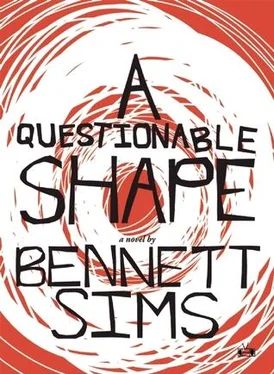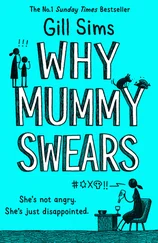It’s one of the few aspects of undeath I’m certain of.
I do not say all of this to Matt. I tell him, in short, that Mr. Mazoch could not be responsible for these windows: that this was not the handiwork of his hand.
But Matt has theories of his own. He shakes his head throughout my speech, and once I’m finished, he asks: ‘Why wouldn’t an infected break some windows? That’s all you see them doing on the news. Beating on windows, punching through walls. They hate the inside.’
Matt has expatiated before on the exteriority of the undead, their compulsive nomadism and aversion to shelter. Unlike ghosts, he has often observed, the undead do not linger in a single space. They’re too itinerant for that, wandering restlessly between a whole chain of spaces. That is usually what he means by ‘They hate the inside’: that they are exterior creatures, the opposite of ghosts. 50But today is the first time that he’s ever adduced this so-called spatial hatred as an explanation for their destructiveness. When he says this I look again at Mr. Mazoch’s house, trying to see the thing from Matt’s point of view. Is this what he thinks ‘hating the inside’ would entail? That it wouldn’t be enough for Mr. Mazoch to simply be outside all the time, wandering from site to site? That he would also have to destroy his house, shattering his own windows? ‘You can’t really believe that,’ I tell him. But Matt refuses to back down. Not only does he believe it, he says, but, ‘I have always believed it.’ He has always noticed this about the undead hand: how it has a wrecking ball’s abhorrence of interiority. How anytime it encounters a wall, a door, it just pounds automatically, beating without rest to bestow openness. Whenever he watches the nightly news, he says, and sees an undead hand bursting through a boarded-up window, grasping at air, he imagines that it hates the inside: that what it is grasping for is more boards, another layer to destroy. 51And whenever he sees, on the nightly news, a group of undead hunched around their victim’s stomach (prying open the rib cage to pick through the intestines, not even feeding, just as if for the joy of it), he imagines that they are destroying the architecture of the body: the abdominal wall, the posterior, anterior, lateral walls. ‘Something there is that doesn’t love a wall,’ he quotes for me now, as if citing Frost as an authority. ‘That wants it down.’
‘All right,’ I say. It doesn’t matter, at this point, whether Matt even believes what he’s saying: he’s hell-bent on inspecting the house. ‘I get it. You need to go inside.’ ‘I’ll just be a minute,’ he says, climbing out of the car. Before he can leave for good, I call after him. He bends back down in the open doorway, resting his hands on the roof to look in at me. ‘Promise me this at least,’ I say. ‘Today’s the last time. Tomorrow and Friday — we play it safe.’ He nods ambiguously, then rises and swings the car door shut. After I watch him disappear into the house, I wait for what seems like much more than a minute — five minutes, ten — before I finally stop counting.
While he’s been inside, I’ve had ample time to think over everything he said. And no matter how I look at it, it leaves me feeling queasy and suspicious. For one thing, I find it worrisome that he keeps defining undeath in opposition to his father: unlike the mortal Mr. Mazoch, who remained indoors like a ghost, the undead are driven to roam about; and unlike the plumber Mr. Mazoch, who helped construct buildings for a living, the undead are supposedly destructive. He seems determined to disambiguate his father’s reanimated body from his father: it is not only not his father, but the opposite of his father. And why would Matt need to believe that, unless he was planning to kill it? Unless he was planning to put it — if not out of its misery — then at least out of its antonymy?
I have been trying to push these thoughts out of my mind. I would like to give Matt the benefit of the doubt. I would like to believe what he wants me to believe about the windows: that he did not break them; that he truly believes Mr. Mazoch broke them; and that he might be right. To believe this, I have to believe that Mr. Mazoch punched those panes, either out of muscle memory (my own reading), or ‘spatial hatred’ (as Mazoch says), or for some other reason altogether. 52But the more I try to imagine it, the more difficult it becomes, and what I end up imagining instead is Matt: planting his feet apart at each window, cocking the bat at his shoulder, swinging his tremendous arcs. Anything to convince me that ‘he’ came back. To keep the search going.
A month ago, when we first established the deadline, Matt made me promise him that I would enforce it. ‘Don’t let me get desperate,’ he told me. ‘Don’t let me go a day beyond the deadline.’ If he ever suggests an extension, we agreed, I am supposed to remind him why we settled on one month in the first place: not only because hurricane season will be beginning in earnest in August, but also because four weeks is the maximum amount of time we thought that anyone could spend looking for his — for a missing person. If all else fails, Matt told me, I’m simply supposed to abandon ship. To inform him that my month is up, and that while he doesn’t have to quit, he’ll be carrying on alone.
At this thought, the car doors’ locks thump upward, on signal from Matt’s remote key fob, and I look through the windshield with a jolt. He is standing in the front doorway, holding up some kind of trace for me to see. A red piece of paper, like a crimson color swatch. It looks like a Netflix envelope, at this distance.
MATT AND I ARE STANDING ON THE ROOFTOP OF Citiplace Cinemas, surveying the empty parking lots below us. The only thing down there is Matt’s car, parked parallel to the boarded-up tickets window. The theater itself has long been abandoned, as have all the other businesses in the shopping center: the Barnes and Noble shut down and the Marble Slab shut down, the baby boutique, the deli, the Federal Express shut down. These buildings are gathered across the parking lot, arrayed side by side to form a village of beige plaster, and the theater looms over them like a kind of castle. When we first got here, I narrowly talked Matt out of breaking into the multiplex, in order to inspect its eleven empty screening rooms. As a compromise, he talked me into climbing up the safety ladder out back. From the roof, he said, we would be able to see for hundreds of yards in every direction. For hundreds of yards there is nothing to see.
Matt stands on the opposite edge from me, commanding a lateral view of the Barnes and Noble. I’m supposed to be keeping an eye on the plaza’s entrance, which I watched through the binoculars awhile. The traffic lights there were still blinking green, then amber, then red, even though the plaza’s intersections have all been barren for weeks. 53Now I’m training the binoculars on Matt. I study the back of his head as he studies the parking lot, waiting for him to turn around and call it quits. He hasn’t so much as stretched his neck. He is keeping a stiff and steadfast vigil for Mr. Mazoch.
On the drive over from Denham, he explained the significance of Citiplace to him and his father. It was the Netflix envelope, he said — for indeed it was a Netflix envelope, spotted in a trash pile on the carpet — that finally reminded him of the site. He was an idiot not to have thought of it before, he confessed: we should have been staking it out every day. He spoke for the duration of the ride, breathlessly briefing me on his history with the building. He and his father had always bonded here before the heart attack. They caught a film more or less monthly once Matt went off to college, when Mr. Mazoch fell into the habit, if he hadn’t seen his son in a few weeks, of calling him on a Sunday and asking (this was the code they’d developed) whether there were any good movies playing. There rarely were. But the movies were only a pretext, Matt said, and he didn’t mind opening the listings and picking a title at random. Superhero films, the stateside remakes of Japanese ghost movies, heist flicks. They always arrived in the early afternoon, sat always in the back row, and were almost always the only audience members there, alone in the bargain darkness of the matinee theater. Mr. Mazoch paid. He liked to pay in cash, Matt said, and a memory he didn’t expect to have of his father — but which he says has persisted in him with startling vividness — is of the man standing outside the theater’s ticket booth at noon: squinting in the harsh, concrete-refracted sunlight, wedging a meaty hand down into his jeans pocket for a wad of wrinkled twenty-dollar bills. After the movie let out Mr. Mazoch typically suggested that they go to the Barnes and Noble across the plaza, where he would entertain himself among the thick antiques guidebooks shelved on the second floor, 54while Matt, over in the literature section, skimmed through a novel or collected poems or volume of criticism (which Mr. Mazoch, if he saw Matt holding on to it when they were getting ready to leave, would gently grab from him like a restaurant check, and pay for at the register himself). To conclude the afternoon Mr. Mazoch treated Matt to coffee and bagels in the bookstore’s café, which is where most of the actual ‘bonding’ took place: Matt asking his father whether he’d come across any good finds at garage sales lately, Mr. Mazoch asking his son how his schoolwork, weightlifting, and love life were going. The coffee, the caffeinated conversation, was the real point of their day together. But when Mr. Mazoch called on the weekends, he never asked, ‘Wanna grab some coffee?’ He always asked, ‘Any good movies playing?’
Читать дальше












